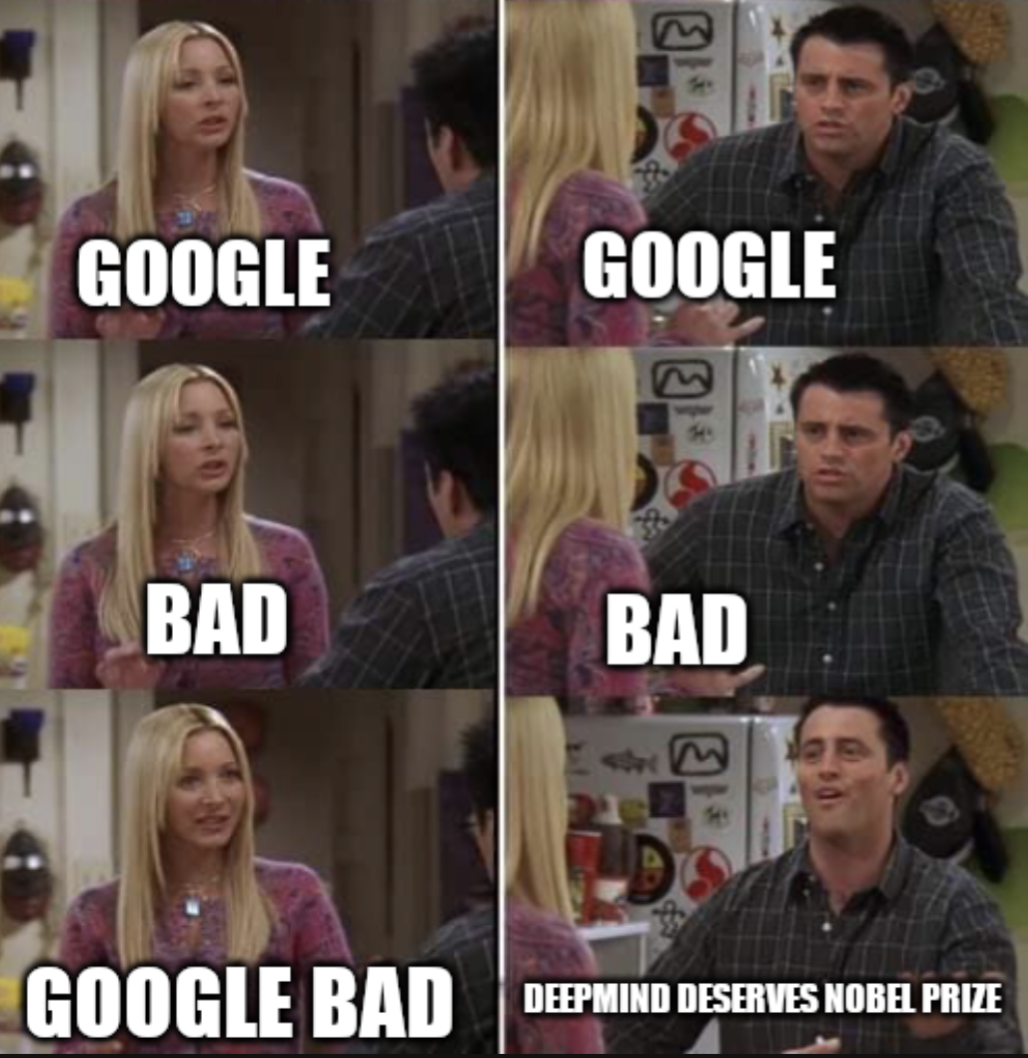If it isn’t search or video, Google always has one foot out the door.
I believe that one of the reasons the stadia failed is everybody knew about the Google graveyard and wasn’t willing to buy into an ecosystem destined to die.
I wouldn’t be surprised to find that this is also something that would affect their ability to attract good talent. People want to feel like they’re working on something meaningful that’s going to stick around for a while. Putting years of your life into developing something for Google just to have it hit the Google graveyard has got to be deeply dissatisfying.
it’s pretty depressing to have watched Google grow from this supposedly amazing company that was willing to develop any amazing idea into something to only caring about how to inject ads into your brain and monetize every shred of data it can harvest from you by any conceivable means.
“Don’t be evil”If it was a fictional corpo with that tagline we’d think we’re watching satire.
When was Google not a data harvesting company? Seriously, their mission statement has always been “collect the world’s information”. They didn’t build Chrome all those years ago for the good of the web. It directly served their primary end-goal of getting you to see more ads.
Feels like we’d have to go back to before 2008 for the Google you’re thinking of, if it ever even existed.
originally, google’s primary purpose wasn’t harvesting your data-- it was search and ads. then there was email. then some other stuff would come and go, and they started hoarding personal data because it made their ads better and their search better. eventually, it became the prevalent underlayer of all of their business, but that’s been over the course of over 20 years.
but it didn’t start that way.
Feels like we’d have to go back to before 2008 for the Google you’re thinking of, if it ever even existed.
well, yeah, lol. google and the world existed before 2008, you know…
Not if your 14
Yes, before 2008. Google was a breath of fresh air against all things corporaty. There was a time when people said “anything good for google is good for the internet” (https://broadbandpolitics.com/2008/07/18/whats-good-for-google-is-good-for-the-internet/). They were instrumental in pushing the boundaries of web 2.0. Google maps with its seamless tiling or auto complete for search results or desktop search were all nothing short of magical at that time. Gone are those days though…
I’m willing to argue it’s the sole reason Stadia failed. I never heard anything bad about the service from people who actually used it. It just never got enough users because Google can’t be trusted anymore. Sundar has destroyed the brand.
I think they could have established trust in it if they kept at it for a little longer, but they dismanteld their first party studio some 8 months after it was started and downsized the Stadia team pretty quickly.
All bad signs if you’re thinking about trying a new service. I bought one game on there for $5 to try it out. Worked fine. I was going to see if their paid version with higher quality was any good the same week they decided to kill it and removed the option to upgrade. Don’t forget they also killed YouTube gaming and their VR thing the same year they launched stadia and were so committed to gaming…
IMO, I think it got memed to death. I never understood how import marketing was until I as a Stadia user saw how much bad PR it had with people who’d never tried it (and were unwilling because of what they’d heard from other non-users).
There’s a reason Tim Cook didn’t wear Apple Vision during the presentation lol.
That’s fair, but years ago when the first iPad was announced, the hashtag “iTampon” was trending on Twitter for days mocking the device. Now, a decade later, your doctor walks in the room with one and can AirDrop you test results.
I don’t think Stadia’s sole problem was in the bad PR, but more in that it came at the end of the last gaming generation’s cycle and then you’ve got the Google Graveyard to counter. If Stadia had come out even a few years earlier than it did, or allowed you a way to play games already purchased elsewhere, gamers would not have gawked at the idea of repurchasing all their games all over again for a product that Google would likely abandon.
I used to watch the news about Stadia from the time it was announced hoping for the best and for some momentum, but it never materialized and then Google pulled the plug when it should have amped everything up to 11 during the pandemic.
Yeah you’re right, there’s a good case that multiple factors lead to Stadia’s failure (not to mention interest rate hikes).
I wouldn’t be surprised to find that this is also something that would affect their ability to attract good talent.
I got the the Foobar Challenge last year. I did the first few levels within a couple days (you get about a week or so to do each one), and then realized I don’t want to work for Google.
10 years ago? Absolutely. 5 years ago? Sure. Now? No way.
Edit: forgot a word
You don’t wanna work for a company that’s trying to penny pinch so hard they don’t even have enough desks for everyone? Spend a couple years of your life building something only for your boss to say “yeah sorry I guess Ruth’s shutting us down”?
Even Microsoft sounds like a better option at this point!
google has a dumbass @ the helm
I doubt he’s a dumbass, but he sure has absolutely zero long-term vision. Dude is all about the quarterly increases in profits, and sadly, that’s all capitalism give a shit about :(
CEOs are just charismatic puppets through which The Board communicates and executes its desires.
Those desires? Higher stock price.
It was hilarious when the Stadia head tweeted that it wasn’t going anywhere and then a month later it was announced that it’s being shut down lol
It was… but it was also kind of sad as a former user… The platform actually had its serious upsides (portability, low device power draw, by virtue of streamed games not exposing the code to manipulation THE BEST anticheat you could ever imagine, etc).
I agree, I was a Stadia user as well. I had some nitpicks with it but it was a solid platform and I played several games on it.
Or these poor folks who got their games published literally 2 hours before the service died.
Yep, I don’t think badly of Google mostly because I don’t think of them at all. While I was deleting my Reddit account a decided I’d try moving off of big tech companies products as much as practical and even after almost 20 years with GMail as my primary mail host I just don’t have anything else left in their ecosystem. Over the years I’ve used a lot of their products, but they kept killing them off (Picasa, Google+, Code, Reader, various chat clients), so I’ve found mostly self-hosted alternatives.
I guess they’re still making money hand-over-fist so whatever they’re doing it must work for them, but none of it is useful for me.
Google is still the number one search engine on the net, and it wouldn’t surprise me if Google Ads is still one of the most widely used online ad services, so yeah, they’ll continue to make bank.
You can also look at the data they have on you used to personalize ads. Their info on me is so hilariously bad that I stopped caring lol. But it does feel nicer to have degoogled my internet experience last year, so there’s that.
I was already on the way to it but Stadia was the thing that finally pushed me all the way out of Google services. I wouldn’t invest any time into any of their products at this point. Especially on the business side, I just can’t fathom choosing Google for anything.
Oh my goodness, could you imagine staking your professional reputation on the next Google product, and they just shut it right down?
That’s a seriously risky individual at this point!
In my view, I think I would seriously question anyone that suggests using Google products for business.
The big tech companies keep trying to sell AR as a gateway to their private alternate realities. That misses the whole point of AR. It’s supposed to augment reality, not replace it.
Everyone who has played video games knows what AR is supposed to look like. Create an API to let developers build widgets and allow users to rearrange them on a HUD.
Obvious apps that would get a ton of downloads:
floatynames - floats people’s names over their heads
targettingreticle - puts a customizable icon in the center of your screen so you know it’s centered
graffiti - virtual tagging and you control who sees it
breadcrumbs - replaces the UI of your map software to just show you a trail to your destination
catears - add an image overlay that makes it look like your friends have cat ears healthbars - they’re a really familiar visual element that you can tie to any metric (which may or may not be health related)I imagine being able to meet my friends at a cafe that I’ve never been to. It’s easy to find because I just follow a trail of dots down the street. As I get closer I can see a giant icon of a coffee cup so I know I’m on the right block. Not everyone is there yet but I can see that the last of our friends is on the bus 2 blocks away. I only met one of them once a few months ago I can see their name and pronouns. We sit around discussing latte art. I get up for an other cup and see from their health bar that one of my friends is out of coffee so I get them a refill. On the way out I scrawl a positive review and leave it floating on the sidewalk.
AR Laser-Tag with your friends. They have health bars and when you shoot them, the damage displays like in borderlands.
You’re right though. Every example I’ve seen demoed is something that teleports you somewhere else. Your own theater. The cockpit of a car, somewhere other than where you’re at. Apple and Microsoft has some Rudimentary floating windows/workspaces, but to me that’s just like looking at a screen anyways. If AR worked like it does in video games, combined with strong image and facial recognition and object detection, giving real time contextual useful information, it could be so ubiquitous that people end up feeling like it’s just another natural part of their interactions with the world around them and others.
Oh yeah! There are all kinds of cool games you could play with AR.
My old school used to get really into “assassin”. Some organizer would divide everyone into a big circle but everyone was only told their connection in one direction (ie everyone knew their target but nobody knew who was targeting them. This was in NYC. Kids would pull out Rayline Tracer Guns in the subway and pop each other. AR would be a much better way to do that.
Games like Pokemon Go would be much cooler with AR.
That, or creepy “uncanny valley” cartoon avatars with no legs. Could go either way.
The legless avatars seem to be mostly a VR thing.
It would be cool if you could mix the two. What if you could meet a group of friends at a coffee shop but if one of your friends was out of town you could have them join you virtually?
The avatar may or may not have legs. We could leave that choice up to the individual. Maybe they want legs. Maybe they want to be a little floaty ghost. Maybe they want to present as a talking frog.
I love this.
What have google brought new to the market before killing it before it gains momentum? My prediction is for them to fall first out of the big tech companies.
In A.I they have lost the race already and the competitors are going to eat their web search in the not to distance future. The biggest thing they have right now imo is android and that only on mobile phones as the tablet is dominated by Apple.
They have lost trust with the tech savvy as we all know their products have such a short shelf life and we have been burnt before. They have very few chances left.
They literally “invented” the method used by chatgpt. They are still ahead with AI research. Their main problem is bringing the value to the market. But that is a management problem. Management has no clear vision unfortunately. But it might takes just few changes at the highest management level to completely change the game. Google has still the best r&d in the tech world, they must return to use it properly
In a way, it looks even worse for a company that it was ahead in the fundamental research, and the corporate bureaucracy and management held it back so much that competitors took the difficult ideas invented there and turned them into products first. My intuition is that it’s easier to fix being behind on a research and technology level than it is to fix having bad corporate culture and complacent management focused only on protecting existing cash cows.
Both are difficult. Microsoft had most money in the world for a long time and never managed to have a barely decent R&D. The only decent internal “original” product was probably c#, that is still a copy of java. The problem is companies focused on making money prefer paying external companies to take the risks of innovation, and eventually buy them. It is the same for big pharma companies. When MBAs are in charge, innovation stops, because MBA fundamentally do not understand it. On the other hand innovation-focused companies struggle to make money, because they don’t understand customers and market.
Google tried to put itself in the middle, a 3rd way, but on the long term money people won, and left the innovation part as those companies that display an original Leonardo’s notebook in the entrance of their offices. It became a prestigious token to show around.
They need to evolve going back in time, otherwise there’s a real risk for them.
And DeepMind is doing things that no one has done before, some of which were groundbreaking contributions to the field of biology. Ah, what am I saying … I got confused. Google bad!
Deepmind deserves a nobel prize, this is a fact

Deepmind was even bought by Google. Let’s hope this “google deepmind” idea won’t kill it. They are crazy good
They’ve been under the fold for a while now. I don’t think they’re in any danger of being graveyarded. I think for them internal politics, part of which being shareholder pressure, will be the challenge to keep on top of.
I was not thinking about graveyard, more about losing the freedom of research to “deliver products to market”. That would mean killing the greatness of deepmind
I was not thinking about graveyard, more about losing the freedom of research to “deliver products to market”. That would mean killing the greatness of deepmind
Graphene is growing fast. They might sell hardware only in the future, but they’ll likely screw that up too. The best android experience is the one without google.
People underestimate google and the commercial side.
Google bard and the AI platforms behind it have been in progress for a decade. Their ability to separate language models for custom uses is perfect for large scale custom operation and direct cloud integration.
Google makes so much in ad revenue that they don’t care about anything else. They can afford to dabble in hundreds of side projects without feeling any actual pressure to deliver on them.
Eventually, the half-assed commitment leads them to cancel projects, or pivot, or start over from scratch. It’s almost predictable at this point.
So true. If a Google team cannot show a believable path to a $1 billion ARR business, your team’s project gets shut down. Unless it falls within strategic priorities which are pretty much just search and ads (eg. this is why Android continues to get support - because it represents mobile defense of Google’s lead in search and ads, not because the phone business on its own is worthwhile to Google).
See https://killedbygoogle.com/
FWIW I don’t think this is necessarily a bad way to run a company. Focus resources on your core competencies. But it really sucks as a user of their non-search-related products.
They’d almost be better off running them as independent startups that the Google brand just acquires if they take off. Would hurt less when they get shelved.
Is this entire article spinning a narrative out of 18 words of criticism in a single tweet?
It’s certainly not a good sign when leads leave during the middle of projects but this article says so much that just isn’t in this tweet.
We get surprisingly little information from within these companies as far as how they operate. But their products have big implications for the public. So when a major exec at a big company publicly criticizes them on the way out, that’s notable, and part of a longer story that I find interesting.
Sundar Pichai is driving Google into an iceberg all the while Google thinks they are too big to fail.
A bit reminiscent of John Carmack leaving Facebook.
We can pile on Google for all their issues, But I’m not sure AR/VR is going to the next big thing.
AR/VR is a thing, and it will be bigger as the technology improves, but I think Google, Meta, Sony, Microsoft and Apple are looking for the next multi-billion dollars blowout tech, but it’s not clear if that’s gonna be AR/VR.
That may be true, but that doesn’t excuse the half a dozen different abandoned efforts they’ve put into this space
next multi-billion dollars blowout tech
From what I can see, other than building a slightly better mouse trap, there’s not much on the horizon. AR/VR is only just kinda cool and AI hype is starting to fizzle. What’s left?
The standalone VR units feel like something that can be a longer term product niche. That said I sure as hell can’t buy one made by Meta. 😵💫 I miss Daydream VR.
The reason it won’t be for me is the lack of multitasking / distractibility.
I can currently play a game, chat with friends, check email, browse random fediverse things, eat a burrito, and annoy my cat sort of all at once.
I can’t really do that with VR as easily. And that’s why I’ll never be for it. I can’t context switch as quickly.
deleted by creator












